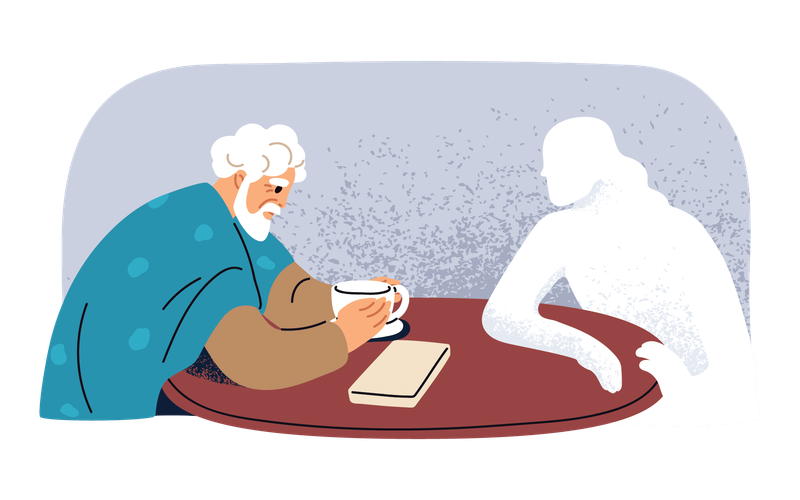19 Things People Say When They’re Falling Out Of Love But Don’t Want To Admit It Yet
In relationships, words carry a weighty significance. Sometimes, what we say hides what we truly feel, especially when it comes to the delicate subject of falling out of love.
The following phrases often arise when someone struggles to confront their changing emotions. Each statement echoes an internal conflict, signaling a shift in a relationship’s foundation without outright admitting it.
This blog delves into 19 subtle expressions that can indicate love’s decline, offering insight into the unspoken truths behind them.
1. “I’m just really tired lately”

Exhaustion can be a veil for emotional withdrawal. When someone claims, “I’m just really tired lately,” it might mean more than just a need for rest. This statement can mask the emotional fatigue that comes with trying to maintain a connection that no longer feels fulfilling.
The physical manifestation of tiredness can be an escape, a socially acceptable shield to avoid deeper conversations. It’s less confrontational than admitting to waning feelings, allowing the person to retreat without uprooting their partner’s sense of stability.
This phrase hints at a deeper disconnection, where emotional energies are depleted, not by life’s demands, but by the complexities of unexpressed feelings.
2. “We’ve both changed”

“We’ve both changed” is a gentle acknowledgment of growth that leads to emotional distance. Often said when partners evolve in separate directions, it hints at a mismatch in current needs and desires. Change is inevitable, but when it becomes a barrier, it can signal a shift in personal alignment.
This phrase softly introduces the idea that who they once were, no longer fits who they are now. It’s a diplomatic way to address the gap that has widened, without directly pointing fingers.
By using this phrase, one can express a fundamental truth—that life’s paths are unpredictable, and sometimes love doesn’t follow the same trajectory.
3. “I just need space to figure things out”

Needing space is often more about emotional clarity than physical distance. When someone says, “I just need space to figure things out,” it suggests an internal struggle with their feelings and the future of the relationship.
This request is a bid to step back and reflect, away from the pressures of togetherness. It’s a respectful pause, hoping to find harmony in solitude. Often, this phrase signals uncertainty, not just about the relationship, but about oneself.
It’s a gentle plea for understanding, a way to navigate the complexities of love, without causing immediate hurt. It acknowledges the need for personal growth and reflection.
4. “Let’s not overthink this”

“Let’s not overthink this” can be a subtle dismissal of underlying issues. When complexities arise, simplifying the situation might feel like the easiest route. It’s a desire to keep things light, avoiding deep dives into emotional waters.
This phrase often emerges when there’s fear that scrutiny might reveal uncomfortable truths. It’s an attempt to brush aside concerns, without addressing the root cause.
By discouraging overthinking, there’s a hope to maintain harmony, though it may be a temporary solution. This can be a way to sidestep difficult discussions, keeping everything at surface level.
5. “You deserve better than me”

“You deserve better than me” is a self-deprecating remark wrapped in care. It’s a way to express insecurities, suggesting that the other person’s happiness would be better served elsewhere. This phrase often reflects a struggle within, feeling inadequate or unable to meet the partner’s needs.
While it might seem like an act of selflessness, it often signals feelings of failure or guilt. It’s a poignant acknowledgment of perceived shortcomings, offering the partner an out without direct confrontation.
By saying this, one attempts to soften the blow of disconnect, framing their own perceived inadequacies as a reason for potential separation.
6. “I’m not sure what I want anymore”

Uncertainty can be a heavy burden. When someone says, “I’m not sure what I want anymore,” it’s a candid admission of confusion. This phrase often signals a loss of direction, not only in love but in personal identity.
It reflects an inner turmoil where past dreams no longer align with current desires. This uncertainty isn’t necessarily about the relationship’s worth but rather the individual’s journey within it.
By expressing this, the person seeks understanding and patience, hoping to reconnect with their true feelings. It’s a call for introspection, a pause to reassess life’s path and its intertwined relationships.
7. “I care about you so much”

Saying “I care about you so much” might sound reassuring, but it can echo emotional distance. It’s a way to express affection without commitment, hinting at a desire to maintain a bond, albeit different from romantic love.
This phrase often emerges when the speaker wishes to soften the reality of changing feelings. It’s a bridge between friendship and love, meant to preserve connection while navigating evolving emotions.
While genuine, it can leave the partner in limbo, unsure of where they stand. It’s an acknowledgment of fondness, yet also a marker of love’s transformation into something less defined.
8. “You’re amazing—I just feel off”

This phrase, “You’re amazing—I just feel off,” blends admiration with a subtle confession. It’s an attempt to separate personal issues from the partner’s worth, highlighting internal conflict rather than external fault.
Often, it’s used to express appreciation while hinting at a personal struggle. It suggests a disconnect between the partner’s perception and the speaker’s current emotional state.
It offers a complex mixture of praise and distancing, a way to express gratitude for the partner’s qualities while acknowledging a shift in one’s own mindset. This phrase reflects the nuanced dance of emotions in a changing relationship.
9. “I’m focused on myself right now”

Focusing on oneself can signal a need for growth beyond the relationship. This phrase suggests a shift toward personal development as a priority, often hinting at emotional withdrawal from the partnership.
It’s not just about self-care but a reconsideration of roles and desires. When uttered, it marks a transition where personal goals eclipse shared dreams.
Here, individuality takes the spotlight, a subtle way to express a desire for independence. While it might be framed as self-improvement, it can also indicate a reevaluation of what the relationship means amid personal transformation.
10. “We don’t have to talk about everything”

When someone says, “We don’t have to talk about everything,” it hints at a reluctance to share each thought or feeling. This phrase may signal a desire to keep some distance, maintaining privacy in personal reflections.
It reflects an attempt to create boundaries within the relationship, a gentle nudge towards less transparency. This can be comforting yet isolating, depending on the context.
While it might foster independence, it may also imply an emotional withdrawal, where full openness is no longer embraced. It’s a shift towards selective sharing, marking a change in connection dynamics.
11. “I don’t know why I feel this way”

Confusion can be profoundly unsettling. “I don’t know why I feel this way” conveys an internal struggle without clear direction. It’s a candid admission of emotional turbulence that lacks an obvious cause or solution.
This phrase often arises when feelings are in flux, a fog of uncertainty clouding the mind. It acknowledges a dissonance between emotions and reality, a disconnect hard to articulate.
By sharing this uncertainty, the person seeks empathy without needing to define what’s wrong. It’s an open-ended expression of bewilderment, seeking time and space to unravel the tangled web of emotions.
12. “This isn’t about you”

“This isn’t about you” is a reassurance meant to absolve the partner from blame. It’s a way to redirect focus away from the relationship, highlighting personal struggles rather than shared ones.
This phrase is often used to separate individual issues from the dynamics of the couple. It’s meant to relieve guilt, but it can also signal a distancing from shared accountability.
It implies that internal battles are at play, ones that need solitary attention to resolve. This statement seeks to maintain emotional safety while dealing with personal complexities.
13. “I don’t want to hurt you”

The phrase “I don’t want to hurt you” is laden with compassion and a foreboding sense of impending change. It’s an expression of concern that hints at difficult truths yet to be spoken.
Often used to prepare the partner for an uncomfortable conversation, this statement is meant to cushion the blow of honesty. It acknowledges the potential pain of forthcoming revelations.
This phrase is a bridge between silence and truth, a gentle way to signal a need for candid dialogue. It’s a prelude to vulnerability, wrapped in empathy and care for the partner’s feelings.
14. “Let’s just see where things go”

“Let’s just see where things go” embodies a desire for non-commitment. This phrase reflects an avoidance of definitive plans or promises, hinting at uncertainty about the relationship’s future.
It’s a way to keep the future ambiguous, open to possibilities without pressure. While it can seem optimistic, it often indicates reluctance to fully engage with the relationship’s trajectory.
This statement can be both freeing and unsettling, offering flexibility while withholding assurance. It’s a pause in expectation, allowing time to explore emotions and circumstances without fixed outcomes.
15. “You didn’t do anything wrong”

“You didn’t do anything wrong” is meant to offer comfort and absolution from blame. This phrase redirects responsibility, pointing to personal issues rather than relationship faults.
Often said to ease guilt, it highlights internal unrest or dissatisfaction, unrelated to the partner’s actions. It’s a way to communicate that the strain isn’t due to anyone’s failure.
However, it also implies a disconnect that exists beyond the partner’s influence, signaling deeper issues. This phrase seeks to maintain respect and care, while acknowledging a shift in personal feelings.
16. “I just feel stuck lately”

Feeling “stuck” is an unsettling sensation. This phrase often points to a lack of progress or fulfillment, both personally and relationally. It signals a need for change, though the direction might not yet be clear.
“I just feel stuck lately” reflects internal stagnation, where life’s movements feel halted. It can indicate a struggle with motivation or purpose, impacting the relationship indirectly.
This expression is a gentle nudge towards transformation, suggesting that current circumstances are unsatisfactory. It’s a call to reevaluate paths, searching for momentum and clarity.
17. “Things are fine, don’t worry”

“Things are fine, don’t worry” is often a surface-level assurance masking deeper uncertainties. It’s a way to bypass potential conflict or concern, keeping everything seemingly smooth.
This phrase can be comforting, yet it often conceals underlying issues that remain unaddressed. It’s a tool for maintaining peace, even if temporarily.
By offering this reassurance, the person avoids confronting deeper truths, suggesting a reluctance to disrupt the status quo. It’s a subtle signal that all is not as well as it seems beneath the façade of calm.
18. “You’re too good for me”

“You’re too good for me” is a phrase wrapped in humility and self-doubt. It suggests that the speaker feels inadequate within the relationship, underlying a belief that the partner deserves more.
This statement often emerges from a place of low self-esteem, projecting internal insecurities onto the relationship. It’s a way to express love and admiration, while subtly suggesting a misalignment.
By saying this, one places the partner on a pedestal, creating a distance born from perceived unworthiness. It’s a tender yet troubling acknowledgment of asymmetry in value or effort.
19. “I just want some time to think”

The need for time to think speaks to a desire for solitude. This phrase underscores the importance of personal space, away from relationship dynamics.
It’s a pause for contemplation, allowing for introspection without external influence. Often, it signals a need to process emotions, away from the immediate demands of partnership.
This request is a gentle push for understanding, hoping to find clarity in isolation. It’s a respectful way to seek individual reflection, suggesting that there are thoughts or feelings that need unraveling.







